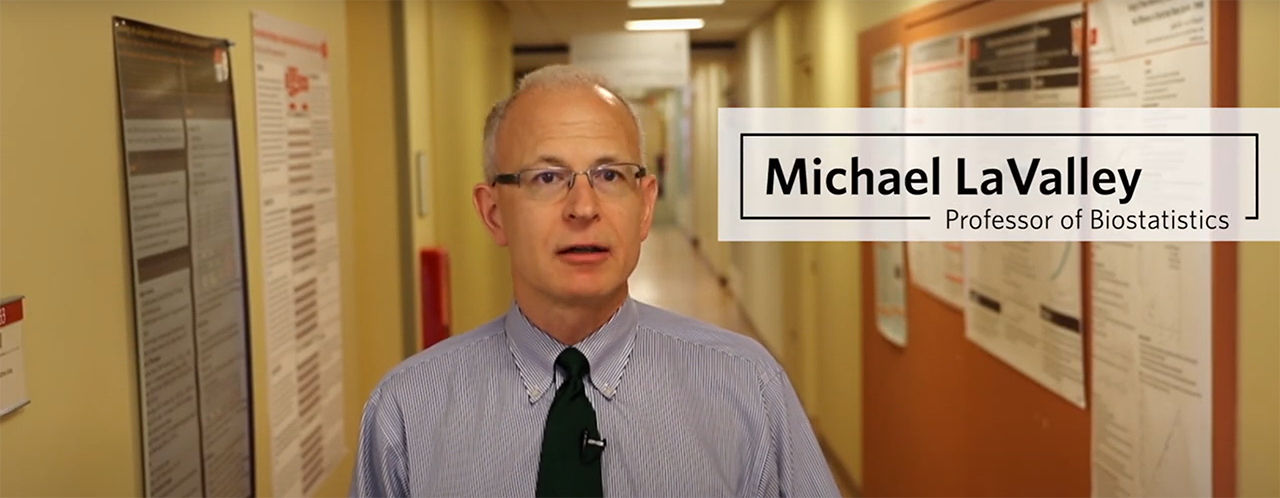Epidemiology and Biostatistics.
As part of Boston University’s on-campus Master of Public Health (MPH) degree, you will choose at least one Functional Certificate as your area of concentration, building upon your interests, strengths and career goals.
Epidemiology and Biostatistics Functional Certificate
This certificate is STEM approved. Please visit the ISSO website for details.
Epidemiology and biostatistics are the quantitative sciences of public health, investigating causes and prevention of disease and injury and assessing patterns of health in populations around the globe. This 16-credit certificate provides training in design, statistical programming, data analysis, and valid interpretation of experimental (e.g., clinical) trials and observational studies. Students will gain knowledge and skills in the methods required to conduct and communicate public health research.
Upon graduation, students will be able to:
- Calculate and apply appropriate epidemiologic and statistical measures to draw valid inferences and summaries from public health data.
- Evaluate the strengths and limitations of epidemiologic and statistical reports from public health studies.
- Analyze key sources of public health data, reflecting comprehension of the basic ethical and legal principles pertaining to the collection, maintenance, analysis, and dissemination of epidemiologic and public health information.
- Synthesize the results of epidemiologic and statistical analyses to craft public health messages in written/oral presentations for both public health professionals and external audiences. Demonstrate the application of epidemiology and biostatistics for informing etiologic research, planning, and evaluation of interventions, public health surveillance, or health policy.
- Demonstrate the application of epidemiology and biostatistics for informing etiologic research, planning and evaluation of interventions, public health surveillance, or health policy.
Sample Course Titles
- Introduction to Statistical Computing
- Applied Statistics in Clinical Trials I
- Statistical Methods for Epidemiology
- Infectious Disease Epidemiology
- Reproductive Epidemiology
- Social Epidemiology
View the BU Bulletin for Course Requirements
Sample Practicum
- A systematic review of potential barriers and facilitators to HIV pre-exposure prophylaxis uptake and adherence among people who inject drugs
- Trends and risk factors for assault-related shootings and stabbings from the Weapons Related Injury Surveillance System
- Development of pharmacy-based initiatives to address barriers to naloxone safety awareness and access in southern New England
- Evaluation of a mood-tracking app to reduce incidence of suicide in the US Coast Guard
- Identification of best practices for accelerometer data error variance reduction in a study of childhood obesity
- Validation of a robust risk prediction model for patients undergoing carotid endarterectomy
- Follow-up study of the chronic kidney disease epidemic in rural Nicaragua
View Career Data
Integrative Learning Experience
Students in the Epidemiology and Biostatistics certificate will create and present a scientific poster based on either a data analysis or critical review of public health research articles.
Certificate Directors
Frequently Asked Questions
Are you a current student in need of advising?
Epi-Bio Certificate Roadmap 2024-2025
Epi-Biostats Certificate Roadmap 2022
Overview of the entire MPH with EpiBiostats Certificate.
Epi-Bio Certificate Handout (PDF)
Description of EpiBiostats Certificate program and list of required and elective courses. Please note: The most up-to-date information on course offerings can be found on the Student Link and the SPH Course Bulletin
MPH Degree Planner (Editable Word Doc)
Tool for planning your MPH courses.
Academic Program Administrators
Marcus Garrant, Epidemiology
Kelly Connors, Biostatistics
Registrar
Graduate Student Life
All students who have officially declared the certificate in Epidemiology & Biostatistics have been assigned an academic advisor for the certificate. Academic advisors are faculty members with expertise in the certificate content. You should have received an email early in the semester informing you of your academic advisor and your advisor’s name should appear when you log into the Academics section of the Student Link. If you still are not sure who your academic advisor is, please email us at epibiost@bu.edu and we will be happy to help.
If you have declared more than one MPH certificate, then you may have a single advisor who can advise you on both of them. Alternatively, you may have a separate advisor for each certificate. You should see your advisor(s) in the Student Link, but you are always welcome to email us at epibiost@bu.edu if you need help.
Which course bulletin should I use if I matriculated several years prior?
Find any previous academic year’s bulletin in the BU
archive.
Is this certificate STEM approved?
Yes, this certificate is STEM approved. Please visit the
ISSO website for more information.
Should I take the required introductory statistical computing course in SAS or R?
After completing the four integrated core courses, you must take one introductory course in statistical computing for the certificate. We offer two versions of introductory statistical computing: BS723 in SAS and BS730 in R. The course content in BS723 and BS730 is identical; the sole difference is the statistical package that is used (SAS or R).
When deciding between BS723 and BS730, you should consider your interests and your long-term goals.
In terms of your interests, consider that some data analysis courses are currently offered in either SAS or R, not both. BS805 is an intermediate SAS programming course that emphasizes logistic regression. BS820 reviews logistic regression and analysis of survival data, and also utilized the SAS statistical package. BS851 specifically explores biostatistical methods for analyzing data from clinical trials using SAS. BS852 addresses the methodological issue of confounding and explores survival analysis in SAS and R. Additionally, EP850 is an applied intermediate epidemiology course in SAS.
In terms of your long-term goals, consider that some public health sectors tend to use SAS more or less than R. If you plan to conduct data analysis in government, academia, biotechnology or pharma (particularly clinical trials), consider taking BS723 since SAS is typically used in these sectors. If you plan to conduct data analysis in global health or sectors with more limited resources, consider taking BS730 because R is free and open-source.
Keep in mind that learning one statistical package makes it much easier to learn a second statistical package. BU Research Computing Services offers free guided tutorials in SAS or R throughout the year, and Harvard offers a free edX MOOC on R as well.
Can I take both BS723 and BS730?
BS723 and BS730 are the same course taught using different statistical packages (SAS or R). Therefore, it is not possible to take both of these courses for credit. Refer to the tutorial link above if you would like basic programming experience in multiple statistical packages.
Can I waive out of BS723 or BS730 and take BS805 instead?
If you have previously taken a graduate level introductory programming course in SAS or R, or have substantial work experience in SAS or R, please contact Jacqueline Milton Hicks (
jnmilton@bu.edu) to discuss your options.
Do I need to be proficient in SAS or R to take the intermediate level course in epidemiology?
EP770: Concepts and Methods in Epidemiology is the required intermediate level course in epidemiology for the certificate. Full-time students will take either BS723 or BS730 concurrently with EP770. EP770 emphasizes the theory and methods of epidemiology, and uses a hands-on approach to data analysis in Excel. Proficiency in R or SAS is not required for EP770.
Can I waive out of EP770 and take EP813 instead?
EP770 is the required intermediate level epidemiology course for the certificate. EP813: Intermediate Epidemiology is an intermediate level course for masters of science and doctoral students. If you have previously taken a graduate level introductory epidemiology course, please contact Bernard Harlow (
harlow@bu.edu) to discuss your options.
Which study criticism course should I take? When should I take it?
Students must take one study criticism course, which will build skills in the critical evaluation of scientific literature. We offer several options for the study criticism course in various substantive areas that focus on particular exposures (e.g., nutritional), diseases (e.g., cardiovascular) or populations (e.g., maternal and child). If you plan to complete a second certificate, you may wish to select a study criticism course that overlaps with an approved course for that certificate. If you plan to take electives in epidemiology and biostatistics, we recommend that you choose the study criticism course of most interest to you. You may take any approved study criticism course after completing the four core courses, with the exceptions of EP850: Applications of Intermediate Epidemiology in SAS; EP857: Design and Conduct of Cohort Studies, which require BS723 and EP770 as prerequisites; EP858: Design and Conduct of Case-Control Studies, which require BS723 and EP770 as prerequisites; and EH757: Environmental Epidemiology, which requires EH725 as a prerequisite (or instructor consent).
Which data analysis course should I take? When should I take it?
Students must take one data analysis course, which will build intermediate level biostatistical theory and analysis skills. We offer six options for the data analysis course, all of which require prerequisite statistical programming coursework.
- BS805: Intermediate Statistical Computing in SAS focuses on developing intermediate level proficiency in programming in SAS (corresponding R code is provided).
- BS820: Logistic Regression and Survival Analysis reviews logistic regression and analysis of survival data, and utilizes the SAS statistical package.
- BS835: Applied Intermediate Biostatistics covers intermediate-level statistical methods commonly used in epidemiologic and public health research. BS835 is recommended for EpiBiostats MPH students who are more epi-oriented to fulfill their data analysis requirement.
- BS845: Data Science and Statistical Modeling in R reviews data manipulation and programming in R, then covers theory and applications in R.
- BS851: Applied Statistics in Clinical Trials emphasizes the development of intermediate SAS proficiency and more specialized knowledge in the data analysis of clinical trials.
- BS852: Statistical Methods in Epidemiology focuses on intermediate statistical proficiency in approaches to controlling confounding in data analysis (versions offered in SAS and R).
- BS858: Statistical Genetics I covers a variety of statistical applications to human genetic data.
Can I take advanced courses in epidemiology and biostatistics that are not on the approved electives list?
You must take EP770, BS723 or BS730, four credits of study criticism coursework, and one data analysis course to satisfy the 16 credits for the certificate.
If you do not plan to complete a context certificate or second functional certificate, you must take 16 additional credits in SPH coursework to satisfy the 48 credits required for the MPH. We highly recommend that you supplement your certificate with additional courses in epidemiology and biostatistics. You may take additional courses from the recommended electives list or pursue more advanced courses. Before registering for an advanced course, you should obtain permission from the course instructor.
I am a part-time student in the Epidemiology and Biostatistics certificate. When can I begin to take certificate courses?
Part-time students should complete the four integrated core courses before taking any certificate courses.
When are required and approved elective courses in the Epidemiology and Biostatistics certificate offered?
This chart indicates when certificate courses are typically offered.
For more information about MPH degree requirements and admissions, request information to learn more.


